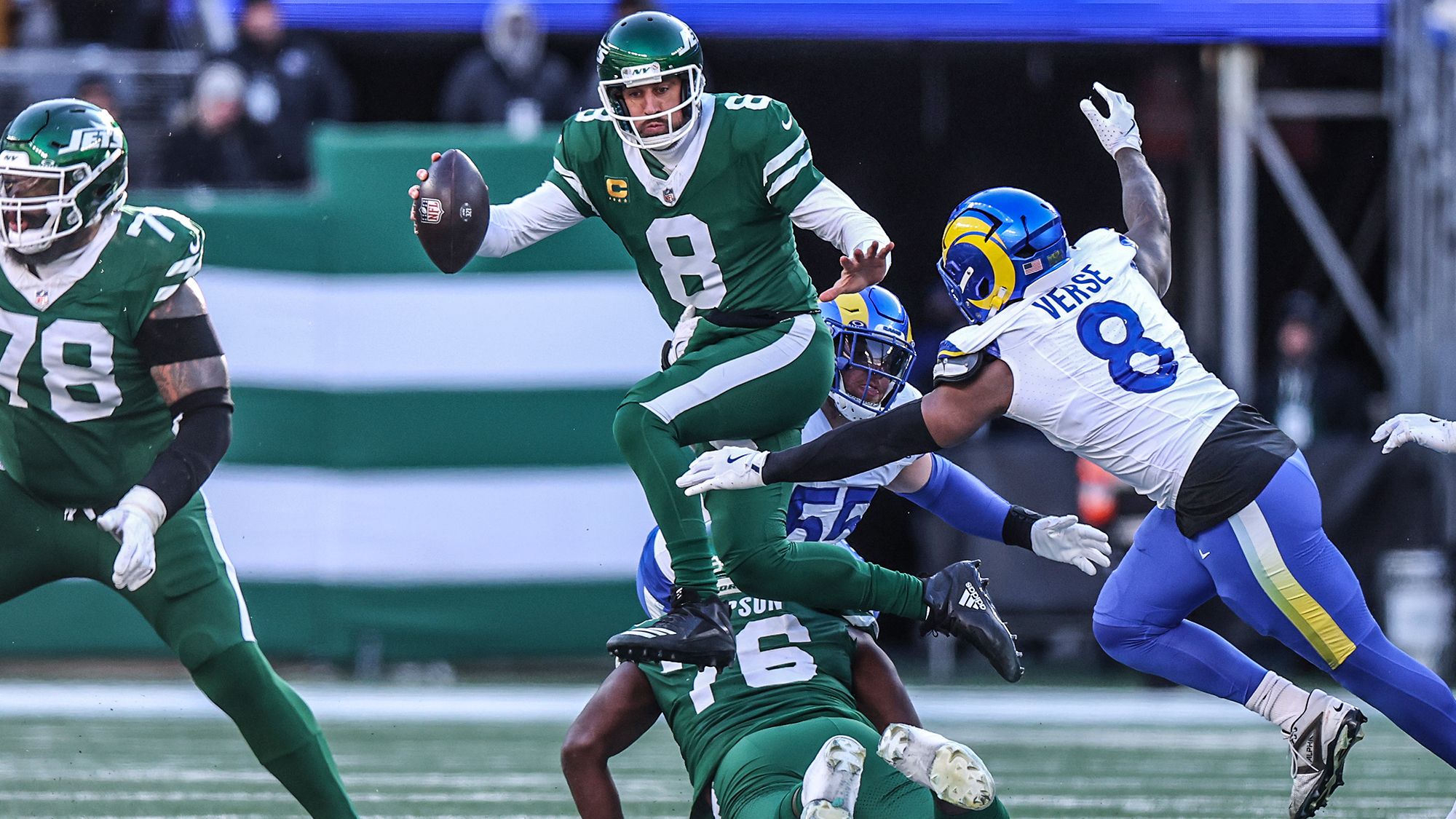The New York Jets did not get the job done once again. Worse yet, they were defeated in a painfully familiar way that surrounded horrendous coaching.
Week 16 Final
 |
 |
|---|---|
Despite their best efforts—or lack thereof—New York dropped its 11th game of the season, this time against the Los Angeles Rams, 19-9. It was a methodical yet fast-moving game; each team had a minimal number of possessions throughout.
The Jets simply did not have enough on both sides of the ball. Worse yet, the Rams’ only two touchdowns of the game came on short fields—one via a failed fourth-and-1 situation and another on the heels of an Aaron Rodgers fumble.
The loss was New York’s 11th in a season filled with excruciating and brutal ones. How did the Jets drop yet another game, though? Follow along as we recap Sunday’s Jets-Rams matchup!
The offense starts strong but falls off late
Sunday’s game was a microcosm of the entire season for the Jets offense.
Aaron Rodgers and company started hot, whether through the air or on the ground. Thanks to some great pass protection from his offensive line, the quarterback dissected the Rams’ coverages. Whether it was Tyler Conklin, Davante Adams, or Breece Hall, Rodgers seemingly always had the answer. The run game, led by Breece Hall, picked up consistent yardage to keep New York ahead of the sticks.
This was on display on the team’s 99-yard first-quarter drive. Through multiple passes, runs, and scrambles, the Jets capped off their drive with a Davante Adams touchdown that opened the scoring.
It felt like, after this drive and the overall play of the unit, the Jets had the momentum and were on their way to winning the game.
However, Rodgers held the ball too long late in the third quarter and fumbled the ball away, which led to the true turning point in the form of a Tyler Higbee touchdown.
From that point forward, it was all Rams.
Rodgers’s accuracy fell off a cliff after the fumble, and the once-impressive-looking offense was nowhere to be found. The Jets regressed to what their offense was before Rodgers regained his mobility; they focused solely on quick hitters and saw Rodgers hyper-fixate on Adams instead of hitting open targets.
To add injury to insult, Olu Fashanu exited with a serious injury. Once he departed, Rodgers understandably became more skittish. He did not wait in the pocket and seemingly felt the pressure more than before.
Ultimately, the game represented the highs and lows of the 2024 season for New York. Rodgers and company have shown flashes of brilliance, whether for multiple drives or multiple games in a row. But in a flash, whether it is a Rodgers injury, a different injury, or a miscue, the whole operation seems to stop in its tracks.
Furthermore, some issues have continued even though there are easy solutions. The primary issue is Garrett Wilson’s target share and target type. Despite being an all-around threat, Wilson is typically only targeted on quick-hitter routes. When he is open down the field, the offense seems to target him rarely.
Consistency has been the main issue for most of the 2024 season for the Jets. And despite two solid games, that issue reared its ugly head on Sunday.
The defense runs out of steam
Unsurprisingly, the Jets’ defense looked to run out of steam against the Rams.
With no Quinnen Williams in tow, New York was severely undermanned against the run. Los Angeles exploited that to a significant degree; running back Kyren Williams ran for 122 yards and averaged 5.3 yards per carry.
And while he was not highly effective in the freezing cold, Matthew Stafford did enough to complement the Rams’ rushing attack. Thanks to some key completions to Puka Nacua and Cooper Kupp, the quarterback consistently had his offense marching down the field.
The Jets’ defense could not stop the Rams’ offense for more than a possession, and it was a recipe for a brutal loss. The minute the Jets’ offense stalled out, the Rams took advantage of their severely weakened and poor unit.
It has been a long and difficult fall for what was an elite unit last season. Whether due to injuries or regression, the Jets’ defense is now part of the problem, not the solution.
The Jets’ defense will not undergo any true changes, whether scheme—or personnel-based, until the offseason. Until then, New York will have to endure the struggles of its former upper-tier unit.
Different game, same miscues
Outside of their play-related struggles, the Jets dealt with the same clock management and penalty-related miscues.
On the day, New York committed eight penalties. A good chunk of these came on offense; whether it was illegal man downfield or holding penalties, the Jets consistently killed their own progress.
The clock management miscues popped up on their last possession; instead of kicking the field goal before the two-minute warning, the Jets lined up to go for the first down. New York proceeded to commit a false start and miss the ensuing field goal.
This does not include the various decisions to go for it on fourth down; some of Ulbrich’s calls were smart, and some cost the Jets potential points that would have been very valuable.
Overall, the Jets are a bad team for a reason. Outside of on-field play, brutal coaching and a severe lack of discipline are the main culprits in New York’s failures in 2024.
What’s next?
New York falls to 4-11 on the season. More importantly, they await the status of their star left tackle and other injured players. They travel to Buffalo next week for an AFC East showdown with the Bills.

